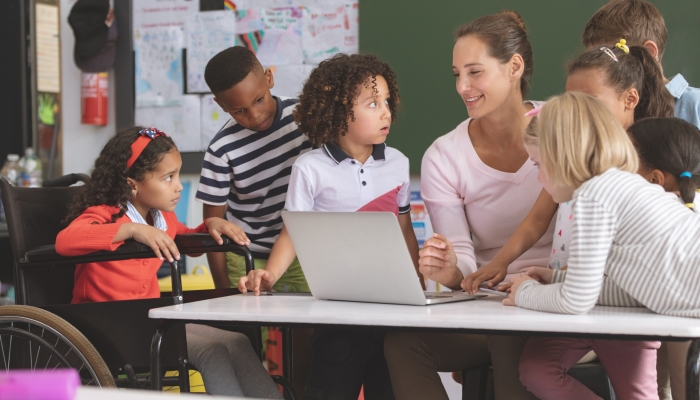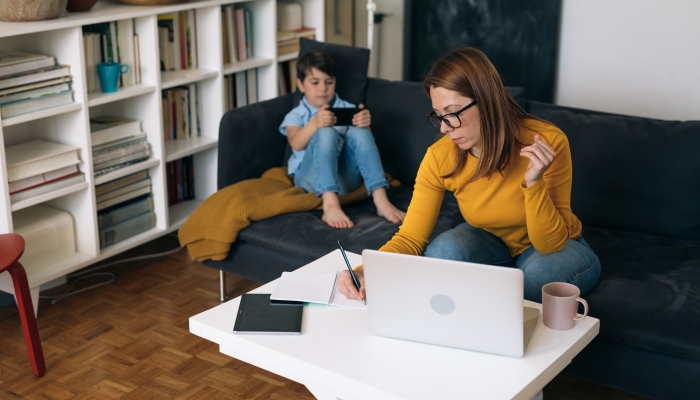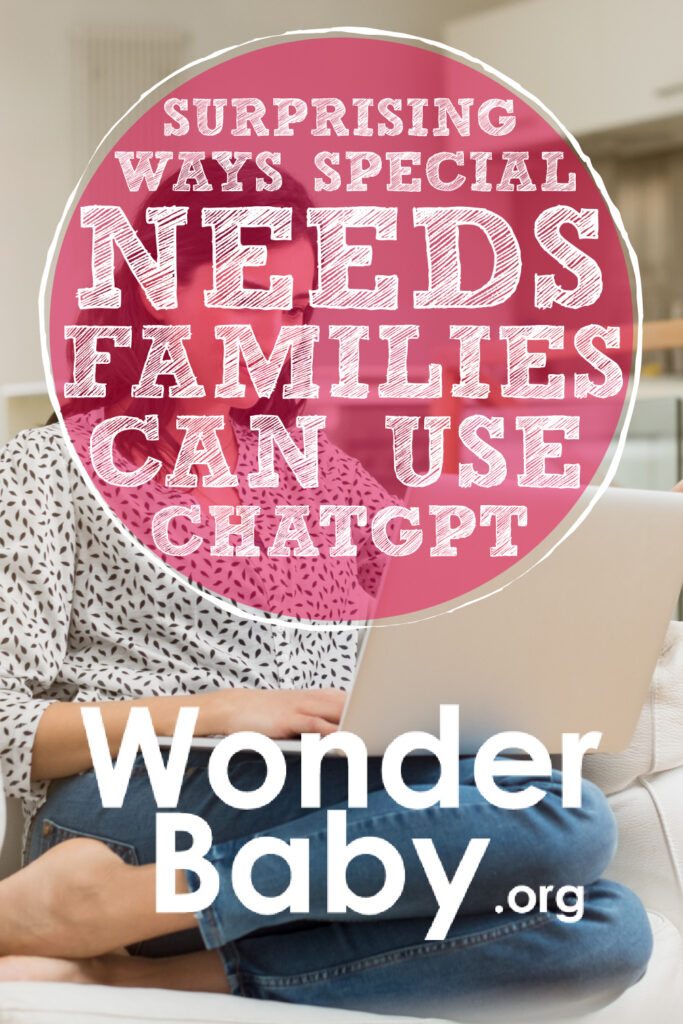7 Surprising Ways Special Needs Families Can Use ChatGPT

- ChatGPT is a computer program launched by the research company OpenAI that uses artificial intelligence tools to remix information from various places on the internet to generate a response.
- Parents of special needs children can use ChatGPT to help with caregiver training tips, scheduling a daily routine, and finding accessible activities.
- You can create a free account with ChatGPT and type questions into the text box to generate responses.
Admittedly, when I first heard about ChatGPT, I wasn’t thrilled. I love writing from the heart and was taken aback when I heard artificial intelligence could generate text within seconds. Could it really do my job?
However, once I learned the various ways to use ChatGPT, my viewpoint changed. While I avoid using it for writing, I understand how it can be a handy companion for those who need answers to frequently asked questions.
ChatGPT for special needs parents can provide guidance and valuable support when navigating the challenges of raising children with diverse abilities.
However, ChatGPT can make mistakes, so you’ll likely want to check facts and essential information. While artificial intelligence is convenient, it’s not perfect.
#1: Generate Caregiver Training Tips

ChatGPT can help guide parents who employ caregivers on what kinds of training or credentials to look for. You can also prepare caregivers for what challenges they may face, including the behaviors and needs of the individual they will care for.
It’s helpful to ask ChatGPT to develop a “cheat sheet” to hand out to new caregivers with tips on how to care for your child.
For example, I asked ChatGPT to create a cheat sheet for a caregiver of a child with autism, and these were some of the critical points it brought up:
- Understanding autism
- Communication
- Routine and structure
- Sensory considerations
- Behavior management
- Safety
- Individualized strategies
While a caregiver of a special needs child likely has experience, it never hurts to guide someone who will be working closely with your child.
Since ChatGPT saves your responses, you can always revisit the ideas it generated for you.
#2: Develop Special Education Resources

You can use ChatGPT to develop special education resources, including Individualized Education Plans (IEPs), to outline accommodations, goals, and support services for kids with special needs.
Additional ways you can use ChatGPT to help develop special education resources include:
- Curriculum development
- Assistive technology recommendations
- Behavioral intervention strategies
- Parent advocacy resources
- Inclusive classroom practices
- Research and best practices
As a parent, special needs advocacy is essential, so consider your child’s needs as you use ChatGPT.
#3: Routine and Schedule Management

One of the best ways to use ChatGPT is for creating a daily routine and schedule management, including time management and tasks.
Letting ChatGPT help with routines and scheduling frees up time and lets you focus on more important things in your life, like spending time with your family.
In addition, ChatGPT can provide advice on how to build flexibility and adaptability into routines to help accommodate changes in plans, sensory sensitivities, and unexpected events.
As a parent of a special needs child, you may also appreciate that ChatGPT can offer advice on optimizing daily activities to promote independence and skill development in kids.
#4: Navigate Special Needs Bureaucracy

Special needs parents will likely tell you there’s a lot of complex legal and medical jargon related to their child’s condition that can be challenging to understand. You can ask ChatGPT to simplify definitions or make information more specific to your situation.
In addition, ChatGPT can help guide you through processes like applying for disability benefits or accommodations at school.
It’s important to note that ChatGPT uses internet data created only up until 2021 and does produce inaccurate answers at times.
It’s best to double-check facts or resources, including an article’s publication date, to ensure accuracy. While ChatGPT is convenient, you don’t want it to bite you.
#5: Find Accessible Activities

ChatGPT can help you identify family-friendly activities that are inclusive and accessible. While it won’t always tell you specific inclusive places near you, it can suggest ideas based on your family’s circumstances.
If you’re on vacation, you can ask ChatGPT for the best places to visit in the town you’re traveling to or what outdoor activities are best for your family. The ideas you’ll get are amazing!
You can also utilize ChatGPT if you’re interested in tips on searching for accessible activities online and using accessible transportation options for attending events.
#6: Explore Assistive Technologies and Home Adaptations

Another great use of ChatGPT is to help provide information on the latest assistive technologies and home adaptations to help special needs families. You can specify your child’s needs and adapt your home environment to make them most comfortable.
In addition, you can ask for real-life examples to illustrate how these solutions can enhance the quality of life and promote independence for your kids.
Educators can also benefit from asking ChatGPT about the best technology for their students to provide a helpful atmosphere in the classroom.
#7: Help With Meal Planning

As a mom of three, I sometimes struggle with dinner, so I’ve used ChatGPT to help plan meals by entering the ingredients I have on hand to create a recipe. As a special needs parent, you can ask ChatGPT for recipe suggestions, cooking tips, ingredient substitutions, and mealtime strategies.
For example, if you’re interested in sensory-friendly recipes, you may ask ChatGPT for recipes with specific flavors, textures, or presentation styles. You can also ask for more instructions if you aren’t sure how to create the recipe correctly.
Don’t forget to ask ChatGPT for shopping lists so you don’t forget any ingredients!
FAQs
Is ChatGPT safe for my child with special needs to use independently?
While building adaptive skills is essential, you should ensure your child is researching age-appropriate material and they aren’t using ChatGPT to complete schoolwork. In addition, ChatGPT collects personal information and user data to help improve their system, so you should know what your child uses the program for.
However, it’s important to note that under the Children’s Online Privacy Protection Act11. Children’s Online Privacy Protection Rule (“COPPA”). Federal Trade Commission. https://www.ftc.gov/legal-library/browse/rules/childrens-online-privacy-protection-rule-coppa (COPPA), collecting personal information from children under 13 without parental consent is illegal.
Why are schools banning ChatGPT?
Many school districts don’t allow ChatGPT, especially on school-issued devices, because it could affect students’ learning and ability to solve problems or write essays independently. For example, students may use ChatGPT to solve math problems without doing the work themselves.
Unfortunately, it also means students could submit inaccurate information, leading them to receive poor grades.
How can parents of children with special needs use ChatGPT to improve their mental health?
While ChatGPT can spread misinformation, it can help special needs parents in several ways, including improving their mental health. ChatGPT can offer empathy, validation, and encouragement to parents navigating the sometimes challenging journey of being a caregiver.
In addition, ChatGPT can offer suggestions for self-care, including prioritizing personal time, seeking support, and staying active.
References
- Children’s Online Privacy Protection Rule (“COPPA”). Federal Trade Commission. (n.d.). https://www.ftc.gov/legal-library/browse/rules/childrens-online-privacy-protection-rule-coppa

Related Posts

Eye Conditions and Syndromes, Visual Impairment
Neuralink Announces Plans to Restore Sight to the Blind with Brain Chip
Elon Musk’s company Neuralink has announced plans to begin human trials of its new “Blindsight” brain chip by the end of 2025.

Special Needs
5 Spring Cleaning Tips for Families of Children with Disabilities
Spring cleaning is an opportunity to create a more accessible, organized, and supportive space for your child with disabilities. Declutter, deep clean, and refresh!

Visual Impairment
The Gift of Understanding: How a Young Child Helps His Blind Father Navigate Life
When a parent is blind, it’s natural for people to wonder how their sighted child will adapt. Will they struggle to understand their parent’s needs? Will they feel burdened by...